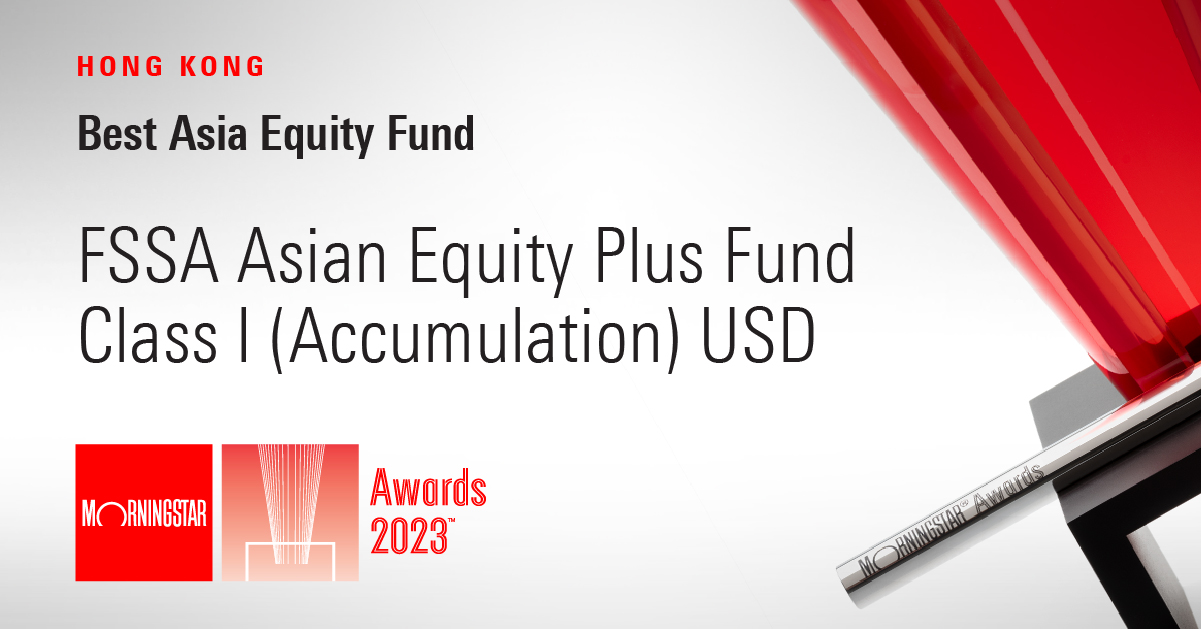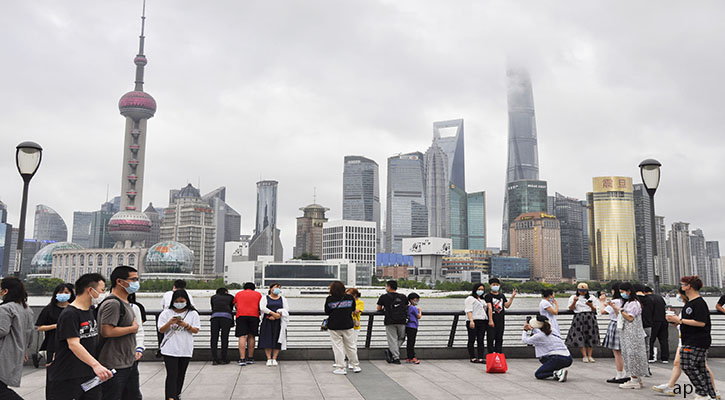
“The strategy benefits from a topnotch portfolio manager and a tightknit and experienced investment team,” says Chloe Qu, senior manager research analyst at Morningstar. “Another strength of this strategy is its well-structured and thorough bottom-up research process, which has delivered impressive track records across all of Lau's Asian and Greater China equity mandates over the long haul.”
Qu says that other trademarks of the investment process include its absolute return focus, low portfolio turnover, and a benchmark-agnostic approach. “Indeed, Lau’s focus on management quality and absolute returns have provided the strategy with strong downside resilience,” she adds. Moreover, as the team aims to identify quality growth companies at reasonable valuations, with particular attention paid to management quality, the strategy has outperformed the index and peers during the three recent market declines in 2018, 2021, and 2022.
On the FSSA Asian Equity Plus Fund, Martin Lau, managing partner at FSSA Investment Managers, talks to Morningstar.
Morningstar: How was the portfolio positioned to navigate the market volatility in 2022? Were there any particular holding(s) or theme(s) that drove the fund’s performance for the year?
Martin Lau: Today, there are about 4 billion middle-class consumers according to the Brookings Institute and more than half of them live in Asia. By 2030, Asia will add another billion people to the ranks of the consumer class (defined as living in a household that spends at least USD 11 per day per person). We believe the opportunity to participate in this growth is a multidecade opportunity.
While China and India, with their large and upwardly mobile workforces, have already been recognized for their growth potential, we find that other Asian countries such as Indonesia, Thailand, Vietnam, and the Philippines also provide good hunting grounds for investing in the rising consumption trend.
Universal Robina Corporation URC, the largest food and beverage company in the Philippines, is a good example of a strong, home-grown Asian franchise. While the business has faced several challenges in the past, the appointment of an ex-Procter & Gamble professional manager, with a high degree of autonomy to reshape the business, was an encouraging start to its turnaround. The group broadly gained market share amid the tough COVID environment last year, and we believe it should come out of this difficult period in a stronger position.
Meanwhile, as incomes continue to grow, Asian consumers are starting to move up the ladder to buy more premium products or buy discretionary products they could not previously afford. Beneficiaries of this trend include Midea Group, China’s largest home appliances company; Shiseido, a leading Japanese cosmetics company; and Colgate-Palmolive India, a toothpaste company with a growing portfolio of premium products.
New purchases over the year included Shenzhen Mindray Bio-Medical Electronics, China’s largest manufacturer of domestic medical devices. The company has a strong track record and has been gaining market share from global leaders as it expands overseas. We believe there are significant growth opportunities ahead, as the penetration level of medical devices in China is still low and there is a growing preference for import substitutions. Mindray has multiple growth drivers to support revenue and earnings growth over the next few years. The company’s main products cover three areas: patient monitoring and life information, in vitro diagnostics (IVD), and medical imaging. Growth across categories has picked up in recent years, and Mindray’s market position for each category has been improving as well. In the domestic market, increased hospital spend on medical equipment is estimated to contribute significantly to its annual revenue, while exports should resume growth shortly.
We also purchased Nippon Paint, Asia’s largest paint company with half of its profits coming from China. Despite the name and geographical spread of the business, the company is now fully controlled by Singapore’s Goh family. As a result, alignment between the owners, shareholders, and the business is now much clearer – and better, in our view. The business is professionally managed and is now run collectively as one group, including Japan. While the group’s results seem likely to remain under pressure for some time, paint is a business with high return characteristics and consumer-business-like metrics. We think the cash flows are attractive and believe the company should be materially larger in a decade. Today, China’s paint market is dominated by business-to-business activities, as well as new-build construction activity. But we expect that the overall China market will end up like most others, with repainting activity driven by consumers. The margin, cash flow, and profitability implications of such a shift are significant, and with even just a double-digit net margin rate (in line with prior expectations), we believe there should be a significant upside.
Morningstar: With various central banks rolling back their stimulus measures, inflation, and ongoing geopolitical tensions, what is your outlook for 2023, and how are you expressing these views in your portfolio?
Lau: Despite positive news around China and Hong Kong reopening borders and easing restrictions, investors still face a growing assortment of headwinds. Politics and security matters have come to trump economics, and conditions look set to remain challenging. We believe the outcome is likely to be slower growth and lower returns on capital. As economies come under increasing pressure, we believe there is likely to be some rebalancing. That said, we see grounds for longer-term optimism. While the outlook for Asian equities is uncertain, valuations are at least now more reflective of economic reality. Meanwhile, high degrees of pessimism and low valuations are often a harbinger of higher future returns. Sharply higher rates and tougher trading conditions typically favor stronger companies as they stand to gain share from weaker players. Indeed, we believe that high-quality equities are still one of the best ways of preserving and growing wealth. Our enduring emphasis on financial strength, alongside the quality of company leadership and franchises, means that our portfolio of businesses should continue to perform resiliently.
Morningstar: What are the key ingredients to your fund’s longer-term success?
Lau: In the FSSA Asian Equity Plus fund, we have invested in quality businesses that have proven management teams and leading franchises. We believe they are well-positioned to capitalize on the long-term secular trends that make Asia an attractive investment choice.
Whether it is the formalization of the Indian economy, the growing middle classes consuming better-quality and higher-priced products, or an aging population looking for better healthcare options, we believe the investment opportunities are plenty. Yet, these kinds of businesses are often not well represented in broader indices, and therefore we believe a bottom-up active investment approach has much value to add. This is especially important when markets are volatile, as they are today. Our investment philosophy does not require us to follow an arbitrary index, nor does it entail buying poor-quality companies at 50 cents on the dollar. Instead, we focus on five core principles that we believe will help us deliver attractive returns for our clients over the longer term.
The first principle for investing in Asia and emerging markets – particularly for long-term buy-and-hold investors like us – is patience. It is rare to identify companies that have both a quality management team and a franchise that compounds free cash flows (or book value per share) at attractive rates for long periods of time. Where we have managed to find such companies, we believe the most important thing is to hold on and do nothing.
Secondly, as bottom-up investors, we look to identify companies with great management teams and strong franchises that are able to grow sustainably over the long term. We don’t pay too much attention to short-term macro forecasts or political events. They are outside of our control, and we do not think we have any great ability to predict such events. However, in some rare instances, external macroeconomic issues can completely swamp even the best-run company.
Thirdly, we believe it is important to stay disciplined through market mania. When it comes to investment performance, avoiding mistakes is just as important as selecting potential winners. During late 2020 and through 2021, there was a frenzy of initial public offerings (IPOs), most of which had dubious business models and sketchy financials. Meanwhile, valuations lost all relation with fundamentals as companies that were beneficiaries of COVID-induced work-from-home strictures were bid up to stratospheric levels. In these phases, it is important to stay disciplined and not be enticed into overpaying for stocks. Our team helps us stay grounded and avoid mistakes in times like these. We have not participated in any IPOs over the past few years, most of which are now languishing below the listing price. Nor have we bought into flawed business models that promise a “path to profitability.”
Our fourth principle is about remaining long-term-minded. The COVID-19 pandemic has dominated most aspects of life and business for nearly three years now, with places like China still battling the spread of the virus. Several of our holdings were also significantly challenged during the pandemic as the unprecedented lockdowns took a toll on their businesses.
Finally, we believe it is important to stick to the process. In seeking companies to invest in, we apply our competitive advantage framework on prospective holdings, looking for those with good governance, strong business models, solid long-term prospects, clearly defined competitive advantages, and high cash generation. Our fundamental company analysis incorporates both qualitative and quantitative research that is designed to assess a company’s ability to compound cash flows sustainably and at high rates over the medium to long term.






















